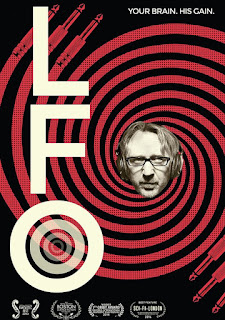People embrace the enchanting glow of the big screen for all manner of reasons; to journey to faraway places they could only ever imagine, to experience the escapism of a captivating story, or maybe to indulge in an obsession with the world of cinema. For me, all three of these reasons apply - and many more - but first and foremost is the satisfaction of recommending obscure films to other like-minded individuals who adopt them as their new favourites.
With over 100 years worth of films to choose from, and many of these now available at the click of a button, it can be extremely difficult to narrow your choices down to pick a film to watch. Although cinema has been around for over four times longer than my life on this earth, I have spent what some may consider an unhealthy amount of these years delving into the history of films to discover some of the best hidden gems out there.
Runtime - 94 Minutes
Imagine if you discovered a way to hypnotise people to obey your every command. Would you use this ability to help others or to take advantage of them? This is the ethical quandary explored in Swedish sci-fi comedy LFO (Low Frequency Oscillator) when Robert (Patrik Karlsson), a man experimenting with sound waves in his home made basement laboratory, uncovers a method of hypnotising and controlling others by exposing them to a certain frequency. Initially, Robert tries to manipulate his own thoughts with simple and harmless tests such as reducing his habit of snacking on unhealthy foods. Once proven successful, he sees the perfect guinea pigs in the guise of his new neighbours, Simon (Per Lofberg) and Linn (Izabella Jo Tschig). As Robert’s experiments intensify, so too does the sinister hold he has over Simon and Linn, and they begin to fill the void left behind when his wife Clara (Ahnna Rasch) and son Sebastian (Bjorn Lofberg Egner) died in a crash that Robert may have caused by tinkering with the family car.
The idea at the heart of LFO is an intriguing one, and
director Antonio Tublen chooses to traverse the darker side of what could be
possible with this technological advancement. Robert is not afraid to exploit
his hypnosis technique for his own benefit, with little concern for the
detrimental impact it may have on others. Much of the black comedy is derived
from the uncomfortable situations Robert places his neighbours in; Simon is
instructed to do Robert’s household chores, whilst Linn is manipulated into
developing feelings towards the sly widower. After the arrival of an old
friend, Sinus-San, who used to collaborate on the project before Robert cut him
out of the loop, we begin to see his cleverly concocted plans unravel at the
seams.
With sound playing such a key role in the story, a lot of
attention has been given to the sound editing and it certainly shows. The deep
rumbling bass frequencies used in the hypnosis and the electronic bleeps
emitted by Robert’s basement equipment create a quirky futuristic atmosphere that
is best appreciated on a surround sound system. The synthesiser heavy
soundtrack, created by director Tublen himself, sets the tone of the film by
instantly transporting us into the strange realm of Robert’s world during the
opening credits, as he spouts technobabble with Sinus-San and his other
accomplices from the comfort of his secret sound lab.
Although limited by budgetary constraints, LFO is still an
accomplished and playful science-fiction endeavour. Aside from a few small
scenes towards the end, the entirety of the film is set in the house where
Robert makes his incredible discovery. Any action that takes part outside of
this location is cleverly alluded to through phone calls, sound recordings and
Robert’s eavesdropping through the microphones he has secretly stashed in his
neighbour’s house. We see the world that Robert sees, including the apparitions
of his dead wife and son who come back to taunt him and question his actions.
This glimpse into his past struggles provides us with a backstory that doesn’t
condone his motivations but allows us to better understand his personal
difficulties and the subsequent questionable choices he makes.
 Intelligent and funny Science-Fiction is somewhat of a
rarity, particularly when the humour doesn’t revolve around spoofing the genre,
and it is refreshing to experience such an original approach to this under represented area of cinema. LFO sidesteps the disturbing implications of the hypnosis by
tackling the subject with an unusual light-heartedness, and this humour takes
the edge off the twisted situations that Robert orchestrates. This isn’t the
kind of film that will have you laughing uncontrollably but there are numerous
scenes that are likely to leave you amused at the inventiveness of the
suggestive screenplay. The bizarre and outlandish ending is a credit to
Tublen’s ingenuity and the perfect conclusion to this fascinating, one of a
kind experience.
Intelligent and funny Science-Fiction is somewhat of a
rarity, particularly when the humour doesn’t revolve around spoofing the genre,
and it is refreshing to experience such an original approach to this under represented area of cinema. LFO sidesteps the disturbing implications of the hypnosis by
tackling the subject with an unusual light-heartedness, and this humour takes
the edge off the twisted situations that Robert orchestrates. This isn’t the
kind of film that will have you laughing uncontrollably but there are numerous
scenes that are likely to leave you amused at the inventiveness of the
suggestive screenplay. The bizarre and outlandish ending is a credit to
Tublen’s ingenuity and the perfect conclusion to this fascinating, one of a
kind experience.If you take the time to watch LFO then it would be awesome if you could also take the time to let me know what you thought of it, either by commenting below or tweeting me @filmbantha. Thanks, and enjoy!



No comments:
Post a Comment